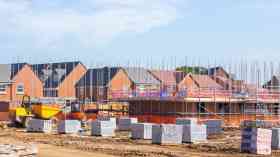Concrete Canvas Ltd is proud to be exhibiting at the International Security Expo for the first time, as we celebrate our 20th year in business.
Poor state of local roads is drivers’ number-one concern
The RAC has reported that the poor state of local roads is officially the UK’s most widespread motoring concern in 2020.
Despite a dramatic fall in car use seen during the early stages of the coronavirus pandemic, some 38 per cent of the 3,068 drivers surveyed listed the condition and maintenance of local roads as a concern, up from 33 per cent in 2019. This put it ahead of other issues such as drivers using handheld phones (32 per cent), the poor standard of other motorists’ driving (27 per cent) and the aggressive behaviour of other drivers (26 per cent).
In particular, the RAC says that there has been an increase in the number of drivers who say local roads have deteriorated, with 52 per cent saying conditions are worse than 12 months ago, compared with 49 per cent who said this in 2019. In fact, only six per cent of drivers think the state of local roads has improved, a dramatic fall on last year’s 11 per cent.
The third quarter of 2020 – July, August and September – saw 1,871 call-outs for damaged shock absorbers, broken suspension springs or distorted wheels – breakdowns that are most likely to have been caused by poor road surfaces. This is the highest third-quarter percentage of all RAC breakdowns seen since 2015.
The Pothole Index, which is the RAC’s most accurate long-term indicator of the health of the UK’s roads, now stands at 1.57. This means drivers are nearly 1.6 times as likely to suffer a pothole-related breakdown as they would have been in 2006 when the data was first analysed in this way.
Nicholas Lyes, RAC head of roads policy, said: “These findings are a big concern given that last year’s relatively mild winter should not, in normal circumstances, have led to a further decline in road surface quality. Usually, RAC patrols see the fewest number of pothole-related breakdowns in the third quarter which coincides with the summer, with volumes having dropped steadily from the high point recorded in the first three months of the year. This normally correlates with councils carrying out work to repair potholes in early spring that have appeared over the winter.
“But, faced with the early stages of the pandemic, local authorities might not have been able to keep up their planned maintenance programmes, possibly due to staffing issues, and local roads suffered as a consequence. This also calls into question just how much progress has actually been made in fixing the 11 million ‘nuisance’ potholes cited by transport secretary Grant Shapps in May. On the flipside, with less traffic, there was perhaps a far better opportunity for councils to fix the roads than in previous years, so we were pleased to see that several local authorities did just that
“While in last month’s Spending Review the Chancellor committed £1.1bn to local roads maintenance in 2021-22, including £500m to fix potholes and resurface roads, we continue to call for a long-term funding strategy for local roads under local authority control to improve and guarantee their condition into the future. The emphasis shouldn’t just be on filling potholes but carrying out proper maintenance that prevents them from occurring in the first place.”
Company Focus
Event Diary
Join us for the landmark 10th Anniversary of the London Build Expo, the UK’s largest and most influential construction and design show.
Retail Supply Chain & Logistics Expo returns to Excel London across 12-13 November, once again bringing together the world of logistics, supply chain, eCommerce and retail innovation for two dynamic days of opportunity.
Every sport, from grassroots football to world-class tournaments, depends on one constant: high-quality playing surfaces and well-maintained green spaces.
Supplier Profiles
Bauder Accepts Keys to its New UK Distribution Centre at Gateway 14
Bauder marked a major milestone in its UK expansion with the official handover of a brand
Words of World: Bridging language barriers with excellence
At Words of World, we specialise in professional translation and interpreting, d
Latest Features
The British Institute of Cleaning Science (BICSc) and the Cleaning & Support Services Association (CSSA) have successfully completed a groundbreaking project aimed at exploring the future of cleaning. This collaboration marks a significant milestone in the cleaning industry, reflecting a shared commitment to embracing innovation with confidence.
The Crown Commercial Service’s (CCS) new framework on Language Services (RM6302), dealing with translation, transcription and interpreting, is live, running from 7th May 2025 to 6th May 2028.














